No dibujos, sólo fangirleo en lo que revivo de la depresión de invierno(?
Don't wanna be here? Send us removal request.
Text
Genuinamente son los mejores, no puedo JAKAKD
Fascinating that misvil's yandere x autism-incarnate main couple has one of the healthiest and most communicative relationships I've seen in media. Goals honestly
82 notes
·
View notes
Text
Killing myself for real, senTÍ TAN FEO CUANDO LEÍ ESO I FUCKING CAN'T

yue wuhuan’s fantasy is literally a meet cute and sweet innocent yearning?!? i’m sobbing.
#i need everybody who has harmed him dead horrifically#he just wants to court his husband and to give his husband nice stuff and to live in a little cottage on a mountain#please give him this#misvil#mistakenly saving the villain#yue wuhuan#MI BEBÉ
43 notes
·
View notes
Text
OMG, todos mis amados aquí aaaaaaaaAAAAAAA❤️❤️❤️✨


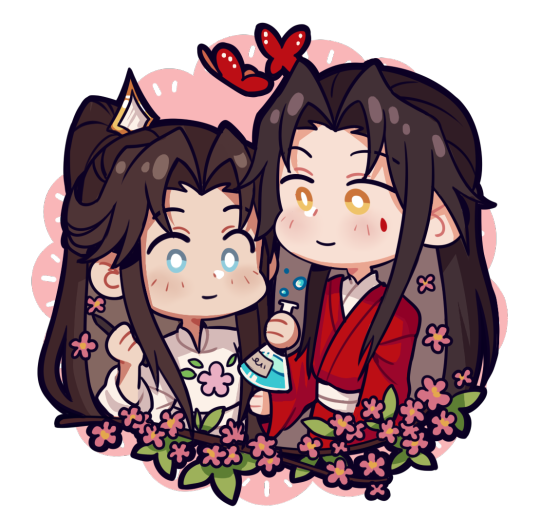
>:3
#misvil#mdzs#the legend of hei#mo dao zu shi#mistakenly saving the villain#Wuxian#Wei Ying#Lan Zhan#Song Qingshi#Yue Wuhuan
340 notes
·
View notes
Text
UUGHHH MI OTP, DIOS, LOS AMO, EXACTAMENTE ESAS CARAS IMAGINABA KAFKSMFKSNFSKSJ
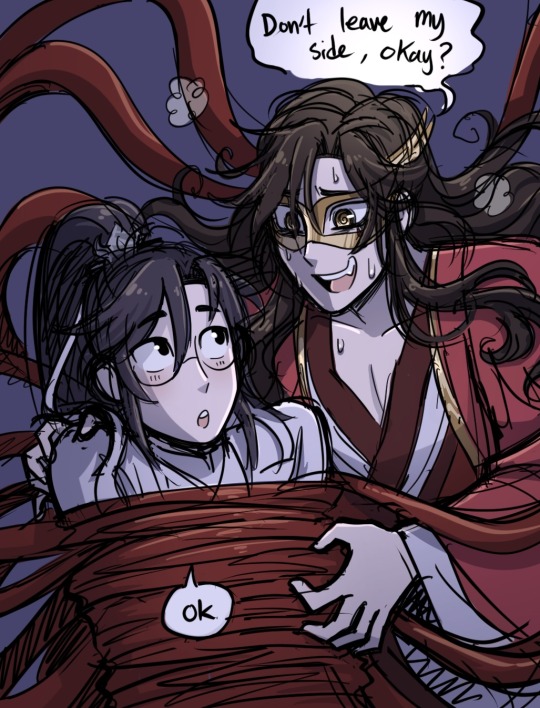
new precious little meow meow acquired
409 notes
·
View notes
Text
LA PIEL ROJA AKFANFNSKDJS NO PUEDO, LLORO DEMASIADO
fuck i forgot to caption this
168 notes
·
View notes
Text
Esto es muy gracioso porque ciertamente al pinche Song Qingshi le vale tanta verga que Wuhuan esté de psicópata a sus espaldas KAFKSJDJSJ
X: Yue Wuhuan casi mata a alguien!
Yue Wuhuan: Eso no es-
Song Qingshi: Pero no lo mató. Eso es lo importante.
Song Qingshi, susurrando: Wuhuan, quieres que lo mate? Puedes tomar mis venenos si quieres...
It’s less “Mistakenly Saving the Villain” and more “Mistakenly Repeatedly Enabling the Villain”
160 notes
·
View notes
Text
DE MIS ESCENAS FAVORITASS QNFKSKFJSJ QUE LINDOS, MIREN, MIREEENN EL PRECIOSO LUNAR DE WUHUAN, ME VOY A TIRAR A LLORAR
Jamás voy a superar que Qingshi sea literalmente una piedra KADKDKGSNDJAJSJ
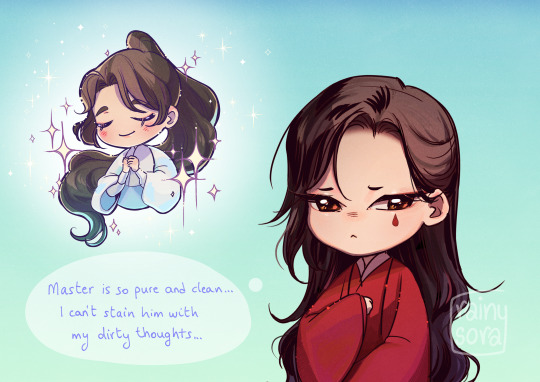

In one of the stops I made while reading misvil, I drew this to sum their relationship up, but now that I have finished it, I BEG YOU, READ MISTAKENLY SAVING THE VILLAIN PLS!!! MIND THE TAGS!!! BUT PLEASE READ IT, I'M IN LOVE WITH THEM!!
Also bonus:
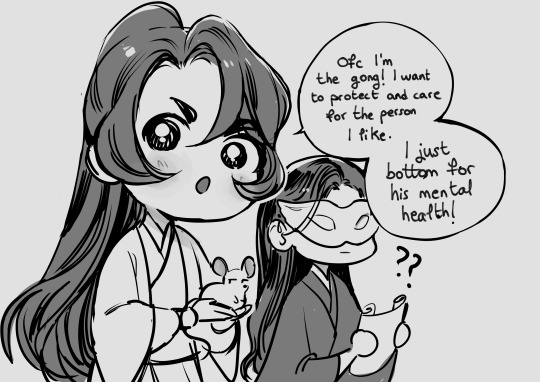
((oh sqs, the wonderful "gong" that you are))
688 notes
·
View notes
Text
Cositos preciosos I fucking can't, son mis bebitosss

old lineart 😔 i didnt wanna color it idk
142 notes
·
View notes
Text
AKDKFMSFNSJSKJDJSJ QUE BONITOS DIOS LOS AMO, LES PRESENTO MI NUEVA OBSESIÓN, EL FÉNIX, EL ALASKA MALAMUTE Y LA PIEDRA-

Taking the boy(toy)friend and attack dog (other bf) on a walk! Thankfully there were only minor scuffles on the way to the dog park!
#misvil#mistakenly saving the villain#yue wuhuan#song qingshi#an long#论救错反派的下场#MIS AMADOS#LA OTP SKFIAKFKSFJSJJ
425 notes
·
View notes
Text
sCREAMING AKFKAFNAJJ

MDZS x Brazil (1985)
(Yes. Real movie dialogue)
1K notes
·
View notes
Text

Normal Friend Behaviour.
[First] Prev <���-> Next
2K notes
·
View notes
Text
QUE HERMOSO SE VE ESTO, ESTOY GRITANDO KAHSGVJASHKDBLADK LOS AMO
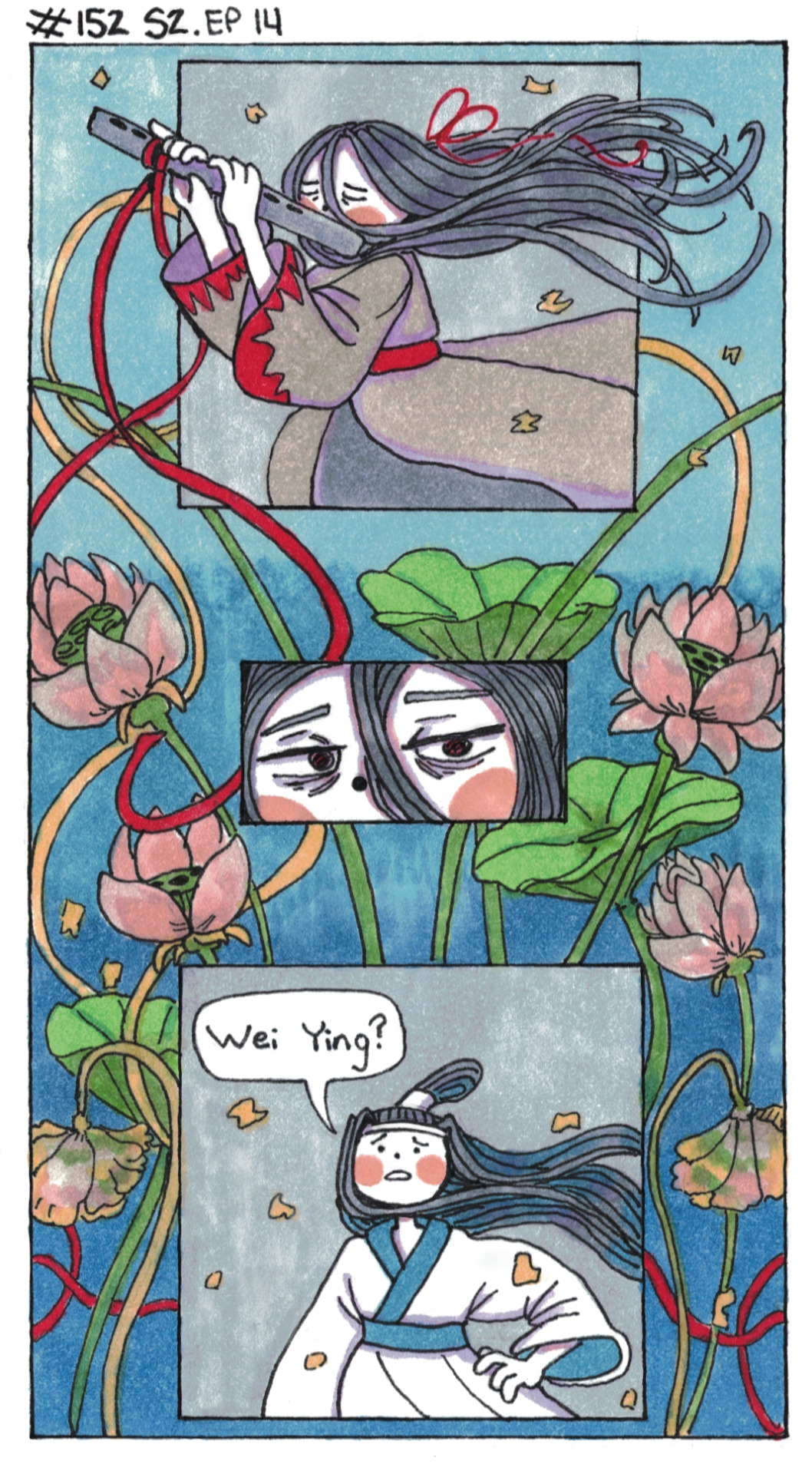
In the shape of you, something new.
[First] Prev <–-> Next
2K notes
·
View notes
Text
why does wei ying get written as uncertain in fics? I’m honestly trying to think of a point where he was uncertain in canon–flailing about, admitting he doesn’t know what to do, fretting about doing something wrong, worrying about the opinions of others.
if wei wuxian is worried about what other people think of him, he is out of character.
again, still legitimately trying to remember scenes where he was knocked off his game, and precious little is coming to mind.
there was the scene right after jin zixuan was killed where he panicked and asked what he was supposed to do, but that was the incident that was basically going to topple his house of cards. everything that he had sacrificed in that moment of decision where he led the wens out of the jin prison camp was about to be rendered moot.
when lwj’s feelings were revealed to him, he was initially confused, but he didn’t panic or dither. he made up his mind about what he wanted and went for it. he shouted out an Exceedingly Honest confession while being held hostage.
he holds back in the xuanwu cave for the first moment, but I’ve brought that up before, and it’s been argued that jc physically held him back. additionally, he took the distraction of the fight as an opportunity to look for a better opening to attack.
wwx can be taken by surprise, but he’s not nervous. he doesn’t really get tongue-tied or flustered until lwj learns to flirt with him, and then that’s a warm, fun back-and-forth kind of exchange. he doesn’t stay short of a comeback for long.
he talks flippantly sometimes, but it’s because his attitude is that it’s best if one can smile. he’d rather have fun in life, no matter how dire the situation. it’s not always possible to have fun, but he found a measure of happiness for himself even when he was living in the Burial Mounds with the Wens. and–coming back to where I started this paragraph–flippant and silly do NOT mean stupid. wwx is observant and intelligent. (don’t @ me about him not realizing lwj’s feelings for him. that was perfectly well-explained in the text of the novel, and I’ve already written posts on it.) he’s also well-spoken. he makes off-the-cuff references to poetry for jokes. he was able to flawlessly recite all the information lqr requested of him. he’s a well-read, highly capable, energetic and active young cultivator.
when there’s something wwx wants to do, he goes for it. he jumps in head-first. I’m so tired of having to click out of fics that sounded awesome because wwx is written as some shrinking violet, or a failing student, or a crybaby wallowing in depression until lwj comes along to “””save him””” god I hate that last one so much.
wei ying works too hard to stay optimistic for me to be reading stuff where he’s given up. he throws himself too passionately into his decisions for all that: ‘but what if I do it wrong? what if I’m a bother? what if I inconvenience someone?’ HE INTENTIONALLY THREW HIMSELF ONTO LWJ TO KNOCK THEM BOTH OUTSIDE THE CLOUD RECESSES IN AN UNDERHANDED BID TO GET OUT OF BEING PUNISHED. why does he get written so often as if most of his thoughts are about the reactions of others, instead of the pursuit of his own goals?
#mdzs#wei wuxian#wwx is so confident#and it comes from within#because he actually has very healthy self-esteem#I think anyone who gives him low self-esteem#is projecting that onto him#not seeing what's actually there in the novel#THIS IS FUCKING RIGHT#Me saca de quicio y estoy absolutamente segura de que es cuLPA DE THE UNTAMED I HATE IT#Wei Ying
516 notes
·
View notes
Text
Noooooo, estoy triste ahora por gente reAL NO PUEDE SER, QUIERO LLORAR, ME VOY A MATAR
The real-life Wei Wuxian and Jiang Cheng - A tale of two brothers
I’ve been asked this before when talking about topics such as Qiongqi beast and its symbolism in Wei Wuxian’s death, the various hints that Wei Wuxian might be long lost royal, the historical background behind the Yin tiger tally, and why the tiger symbol seemingly being bad juju for Wuxian.
It’s all connected, of course, through a historical basis. I have some free time today, so let’s get!
Meet Wei Wuji, also known as Lord Xinling, the second Prince of Wei Kingdom (circa 2nd century BCE), the first person in recorded history to handle a Tiger Tally, and very very likely to be the real-life basis for Wei Wuxian.

How very likely? Well, there’s no word of god, of course. But I’ll just let the facts speak for themselves, and you be the judge.
1. Let’s start with names:
Wei Wuji 魏無忌
Wei Wuxian 魏无羡
Wei 魏 = Wei 魏. An exact match. As a matter of fact, Wei Wuji’s Wei kingdom is the first kingdom to bear this Wei name in recorded history.
Wu 無 is the traditional form of Wu 无. In the Japanese, Taiwanese, and traditional Mandarin versions, Wei Wuxian is also written with this Wu 無.
The original meaning of Ji is ‘envy, hatred’ in ancient times (as per the Kangxi dictionary and the original text of the Romance of the Three Kingdoms). In modern times, the meaning of Ji has morphed to represent ‘fear, avoid’ more than ‘envy’ and ‘hatred.
The meaning of Xian is envy in both ancient and modern times.
So Wei Wuxian is effectively an alternate way to write Wei Wuji.
2. The life and death of Wei Wuji and the first Tiger Tally recorded in history:
a. Genius second son, a friend of many, the brightest 4th Young Master:
Wei Wuji was born the second son of King Wei Zhao and the second prince of the Wei Kingdom. He had an elder half-brother: Wei Anli, crown prince and, afterward, King of the Wei Kingdom.
Despite being the younger brother and not the heir to the throne, Wei Wuji eclipsed his elder brother in talent, courage, military and political acumen, and sheer popularity.
Wei Wuji was also unique among his period peers for being very open-minded when it came to castes. He lived during the warring state period, during which there existed an extremely strict caste system where the lower and slave castes didn’t even count as humans and could be executed for silly things like being in the presence of their higher caste masters and ‘tainting the air’ they breathed. Not only did Wei Wuji give no thought to this caste system, he would often go out of his way to listen to the lower castes and treat them with respect as if they were of the same caste.
In one legend (Sima Qian Historical Records, circa 135 BCE), Wei Wuji walked away from a banquet raised in his name to go sit and talk to an old, wise prison guard (Hou Ying). He would then invite this prison guard to his banquet with the highest of honor, even giving the guard his seat (noble seat) and driving the chariot in his place. When other noble banquet guests protested this lowly guard’s presence by vilifying the old prison guard for not knowing his place, Wei Wuji stood up for him and gave him the highest of toasts, thus silencing the guests.
In another legend, Wei Wuji hosted over 3000 guests in his princely fiefdom. He famously declared that so long as a person had ambitions and a will to do good in his heart, then Wei Wuji would receive him in his hall as a guest and friend regardless of what caste he was or from where he came.
For this, Wei Wuji was known as Lord Xinling and held the loyalty of many in his own brother’s kingdom.
He was one of the Four Gongzi of the Warring State Period (lit. Four Young Masters, Four Noblemen, Four Princes. During this period, Gong was a distinct noble class comparable to Duke. So this can also be understood as the Four Dukes). He was seen as the brightest among the Four.
b. The tale of the first Tiger Tally in recorded history:
Sima Qian Historical Records told the tale of the first Tiger Tally as such. It was a time of chaos where the strong trampled the weak, and big countries gobbled up small ones. Wei Kingdom was one of the seven strongest of the time. This meant that their position was precarious.
Around this time, Wei Wuji’s elder brother, Wei Anli, had ascended the throne and adopted a policy of avoidance. Despite the ferocious fighting, the political struggles, and the easily foreseeable threats, Wei Anli was of the thought that if he did nothing and just closed his door, then trouble wouldn’t come knocking at his door.
But this was not so. In 260 BC, the state of Qin (of Qin Shi Huang, yes) besieged the state of Zhao and captured the King of Zhao (who was related to the Wei through marriage). Zhao sent for Wei’s help. But King Wei Anli didn’t want to be Qin’s next target, and so refused to send aid.
This was where the Wei brother’s opinions diverged. Wei Wuji saw that Qin was growing unchecked in power, and if not stopped, then Wei would be next on the chopping block anyway. So not only was Wei politically and morally responsible, but from a long-term strategic standpoint, Wei must respond if they didn’t want Qin to grow too strong and eventually be invaded and absorbed into Qin itself.
The only problem: Wei Wuji had no right to make this decision. And regardless of his insistence and explanation to his elder brother, Wei Anli would not be moved. Meanwhile, the state of Zhao sent ever more desperate pleas for help (from the Wei’s sister who was Zhao Queen at the time no less).
Pressured from all sides and with no alternative, Wei Wuji made a decision that would go down as a first in history. He would steal the Tiger Tally from his King’s hand, commandeer the army, and ride to answer Zhao’s pleas for help himself.
This would eventually become the historical example of military brilliance that required the usurpation of the immediate superior. Wei Wuji’s own name would go down in history as brilliance that eclipsed his station.
I’ve written on the tiger tally before. So I won’t write more about this now.
To summarize things, Wei Wuji’s plan worked. Zhao was saved. But at the cost of a rift between brothers. After lifting the siege, Wei Wuji stayed in Zhao for ten years.
He would only go back to Wei Kingdom when Wei was besieged by Qin in purported retaliation, bringing with him the 3000 guests that stayed loyal to him and went to Zhao for help. Wei Wuji successfully lifted the siege of Wei and the two brothers reunited after a decade of not seeing each other. They cried and embraced one another. Wei Anli made Wei Wuji the Grand General of Wei, and he then took over the safeguarding of Wei against the onslaught of Qin.
c. The tale of two brothers. Or, as the Chinese say, the King has no brothers. The King has no equal. Fool is he who dares think himself the King’s brother and equal.
Despite the fact that the brothers reunited, this tale does not end well.
Wei Wuji was a brilliant general and a ferocious warrior. But more than that, his reputation far eclipsed his elder brother the King. Ever since they were young, Wei Anli had had to suffer being under the shadow of his little brother, despite his being the heir and then King.
Wei Wuji not only successfully repelled Qin, but he also started making a plan to counterattack and nyx Qin Empire before it could take shape. Because his reputation was such that countless warriors and scholars answered his call to arms. Five other kingdoms also answered his request for an alliance.
The King of Qin was deathly afraid of Wei Wuji. Violence did not work, so the Qin King attempted the other way: through schemes and manipulation. The Qin King sent enormous fortunes and gifts to Wei Anli under the guise of normalizing relations between the two kingdoms and potential peace. Along with his gifts, he would send people, spies of all ranks and castes, to infiltrate Wei Anli’s court and territory. These spies would continuously do things to increase the friction and gap between the two brothers.
Some of them would falsely congratulate Wei Wuji for having ascended to the throne.
Some more would treat Wei Wuji with more deference than Wei Anli.
Some would then whisper into Wei Anli’s ears: “Prince Wei was away from his own Kingdom for 10 years. And yet when he calls, thousands in Wei Kingdom answer him. Why is it him and not you, the King? Do your people only know Wei Wuji and not Wei Anli. Are you sure it’s still you who is the King? He should know his place!”
Wei Anli… fell for their tactics. So he demoted Wei Wuji and effectively isolated him from the court. He would then give this position to someone else. So, of course, the plan to counterattack Qin with the 5 ally kingdoms fell apart miserably.
Wei Wuji was heartbroken by his own brother’s action. He descended into alcoholism and purportedly died from depression and failing health. In other words, he died from the betrayal of someone who saw as a brother but that same brother saw him not as a brother but as a rival and a carrier of problems.
Wei Anli died in the same year as Wei Wuji, purportedly from illness.
18 years later, just as Wei Wuji predicted, Wei Kingdom was conquered and subsumed by Qin. Qin would then go on to become the first true Empire in Chinese History.
Wei Anli was not technically the last monarch of Wei. But it’s historically agreed that he’s the one who laid the foundation for the fall of Wei due to his suspicion of his own brother and removing the one person capable of turning the tide of Qin.
So, I will leave this here for you to come to your own conclusion and come back another day for analysis on the parallels between history and story and a few other somewhat ironic anecdotes that I didn’t include here (Like the fact that between the 2 Wei brothers, it’s the real-life Jiang Cheng, Wei Anli, that was the gay one. How gay are we talking about? So gay he’s the origin of Chinese gay porn)
821 notes
·
View notes
Text
youtube
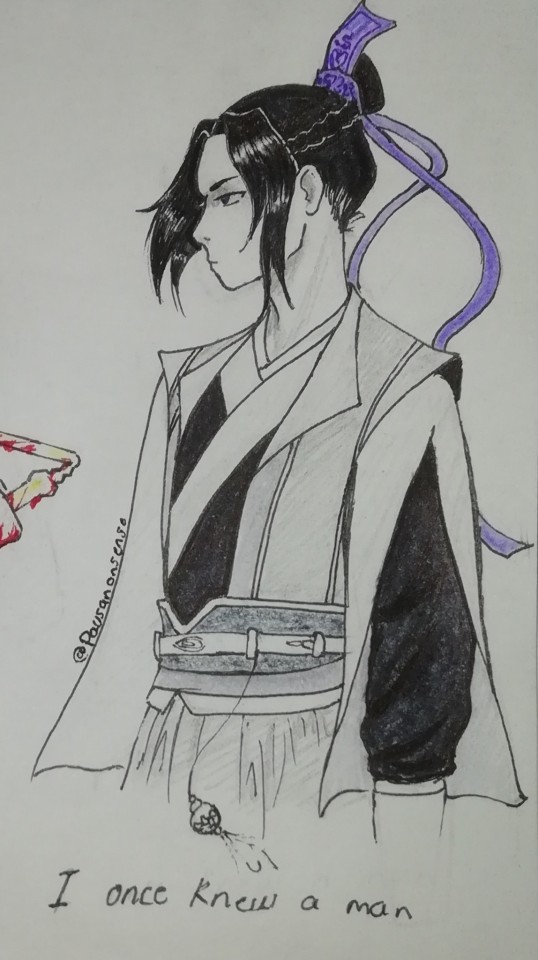
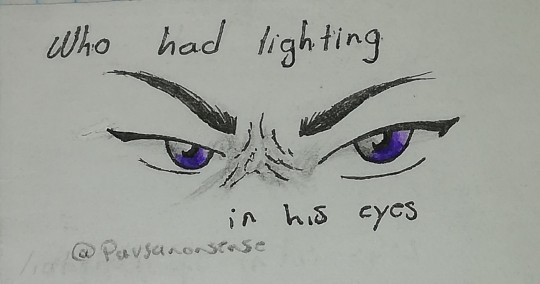
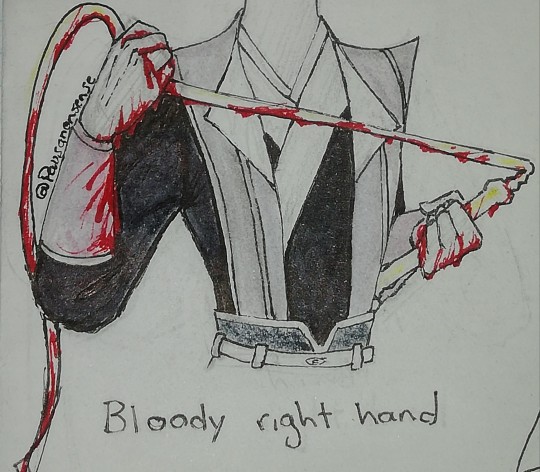
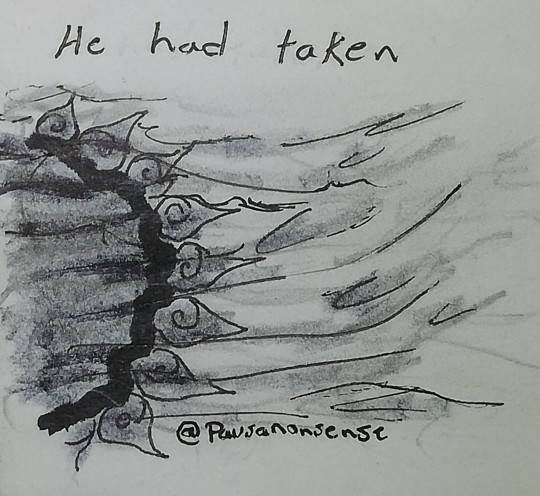
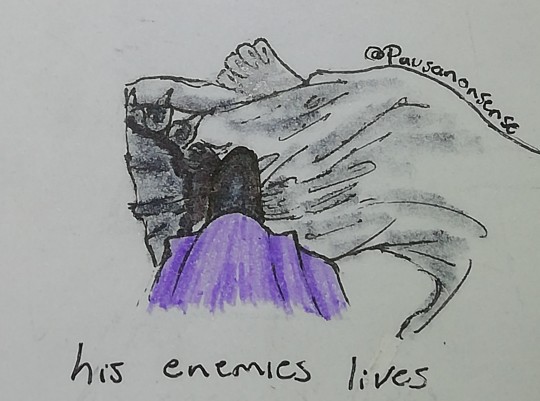
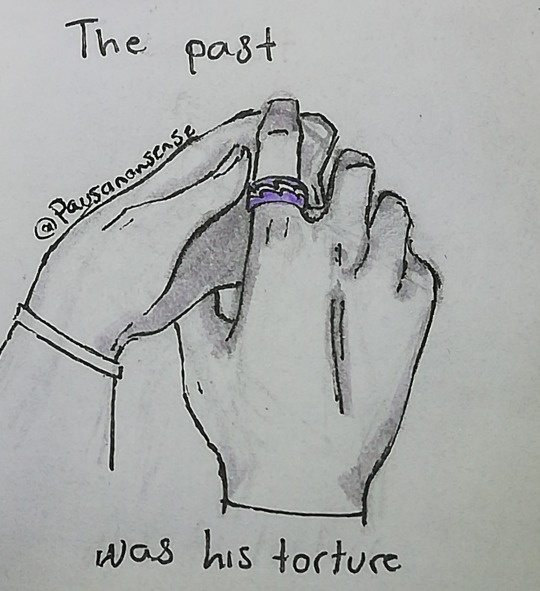
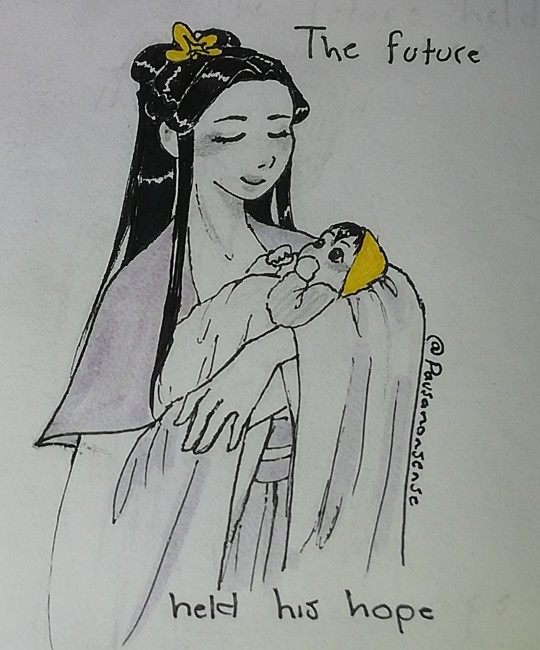
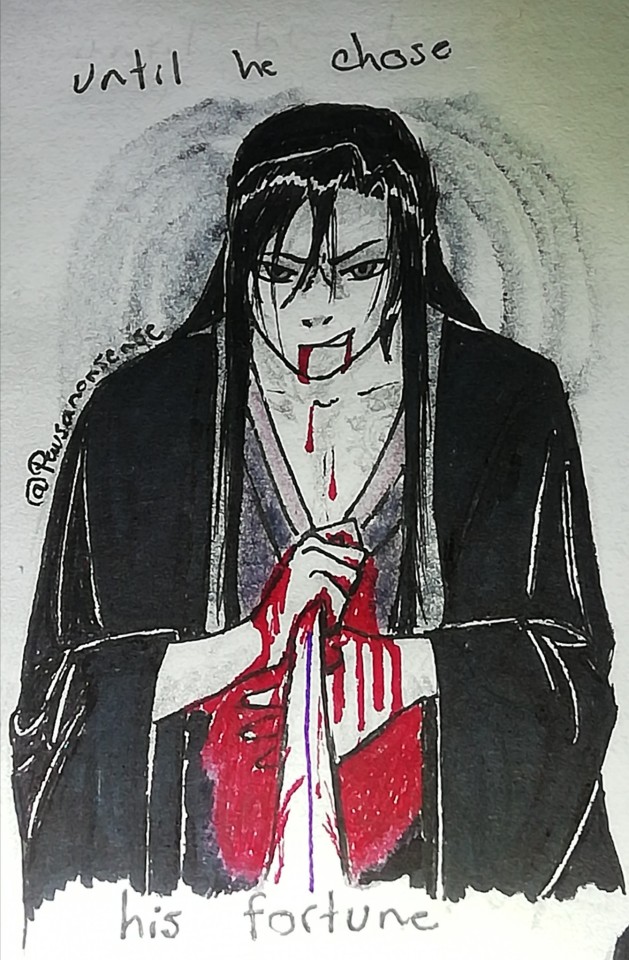
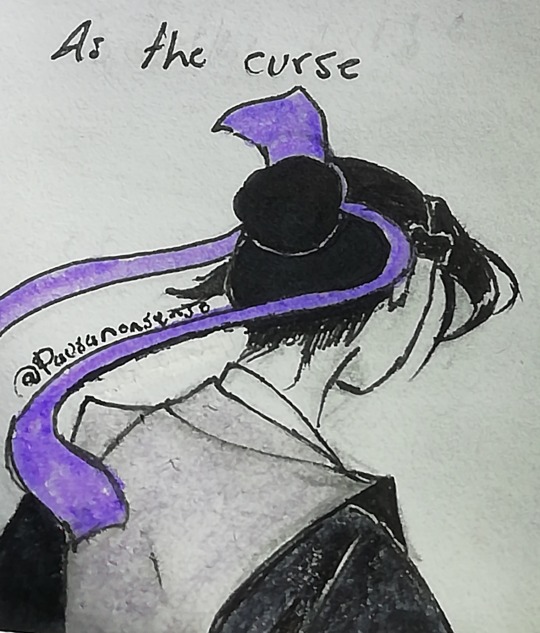
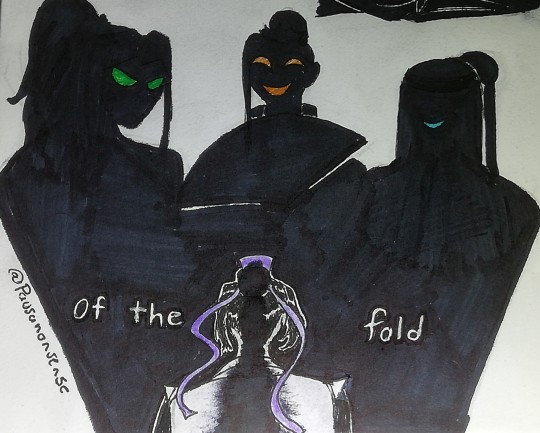
Es lo primero que dibujo en el año, ah. Espero seguir haciéndolo, ya no recuerdo cómo hacer cómics jaja, chale
Intenté subirlo a tiktok, pero soy inútil con las transiciones aaaaa Salió todo feo, pero ya me dio pena borrarlo, no lo quiero volver a hacer
Alerta de mucho texto xD
Honestamente quería subir esto en Twitter también, pero veo un chingo de posts debatiendo sobre Jiang Cheng y, aunque estoy dispuesta a meterme en la pelea y amo a Jiang Cheng, sus fans me sacan de quicio. Siento que no se dan cuenta de que están defendiendo las malas decisiones que Jiang Cheng tomó cuando estaba siendo manipulado emocionalmente por los villanos canónicos, plz?? Dicen que fue lo correcto por X y Y justificaciones que abandonara a Wei Ying, que dirigiera el asedio contra los Wens, que mataran a todos y se sacan leyes antiguas que pueden o no ser adecuadas para la época, pero la novela te da todo el contexto que necesitas para comprenderla porque tiene su propio sistema de magia y no está ubicada en ningún período histórico real, además la autora dijo que Wei Ying es moralmente perfecto, no podemos quedarnos con eso y ya? Desde cuándo dejamos de tomar la palabra de los autores como la máxima guía del canon??? I hate Twitter
The Curse of the Fold la pensé primero para Lan Zhan porque él también cometió el error de volver a su Clan donde nadie estaba buscando respuestas, sólo siguiendo reglas a lo menso, pero Jiang Cheng es tan buen personaje en que demuestra cómo sufrir no te hace necesariamente mejor persona o más fuerte, Jiang Cheng terminó solo y miserable, arruinado por sus inseguridades, no tiene un final feliz, atrapado en el mismo ciclo tóxico en el cual lo metió su madre, con las inseguridades que nutrió su padre. El hombre es el trauma generacional encarnado and he's so real for that y lo amo. No es un villano, pero tampoco fue sólo una víctima, es un personaje muy complejo y me da angustia sentir que lo quieren volver políticamente correctO DÉJENLO CON SUS MALAS DECISIONES, además, si bien recuerdo, se queda su final abierto como que tiene posibilidad de mejorar post canon, eso me gustó mucho, no sé, esa es mi opinión
Si alguien tiene otra opinión al respecto, pueden literalmente pelear conmigo, no tengo miedo de una buena discusión con otras entusiastas de MDZS! Es mi primer danmei y lo amo con mi vida!!
19 notes
·
View notes
Text
Terms You Might Want To Know For Your Wuxia/Xianxia Fic
MXTX's danmei are getting increasingly popular, and the fandoms are getting more fic-happy. I've noticed that some writers seem interested in writing their own fics but are concerned of making mistakes with niche honorifics and titles. I've noticed some that have jumped right in, but have made innocent errors that I'd like to correct but fear coming off as rude or presumptuous. And so I've made this list of terms that covers the basics and also some that are a little more niche since they're usually directly translated in cnovels.
DISCLAIMER: This is by no means a comprehensive list of everything one needs to know or would want to know concerning ancient Chinese honorifics and titles, merely what I myself consider useful to keep in mind.
Titles
Shifu: 'Martial father'; gender-neutral
Shizun: 'Martial father'; more formal than 'shifu'; gender-neutral
Shimu: ‘Martial mother’; wife of your martial teacher
Shiniang: ‘Martial mother’; wife of your martial teacher who is also a martial teacher
Shibo: elder apprentice-brother of your shifu; gender-neutral
Shishu: younger apprentice-brother of your shifu; gender-neutral
Shigu: apprentice-sister of your shifu
Shizhi: your martial nephew/niece
Shimei: younger female apprentice of the same generation as you
Shijie: elder female apprentice of the same generation as you
Shidi: younger male apprentice of the same generation as you
Shixiong: elder male apprentice of the same generation as you
Shige: elder male apprentice of the same generation as you, specifically one who has the same shifu as you or is the son of your shifu
Zhanglao: an elder of your sect
Zhangbei: a senior of your sect
Qianbei: a senior not of your sect
Wanbei: a junior not of your sect
Zongzhu: Address for a clan leader
Zhangmen: address for a sect leader
Daozhang: Daoist priests or simply a cultivator in general; gender-neutral
Daogu: Daoist priestess or a female cultivator; not as commonly used as 'daozhang'
Xiangu: Daoist priestess or a female cultivator; not as commonly used as 'daogu'
Sanren: a wandering cultivator
Xianren: 'Immortal Official'; a title of respect and power like 'General'
Xiuzhe: 'Cultivator', can be shortened to 'Xiu'
Xianjun: 'Immortal Master/Lord'
Xianshi: 'Immortal Master/Teacher'
Dashi: 'Great Teacher', address for monks
Xiansheng: Teacher/Sir; in ancient China, the connotation is very scholastic
Houye: address for a duke
Jueye: address for a noble lord, ei. a duke, marquess, earl, etc.
Wangye: address for king/imperial prince
Daren: address for imperial officials
Furen: Madam; the wife of an imperial official/nobleman OR a married woman granted a rank by the royal family
Nushi: Madam; the counterpart of 'xiansheng', connotation is scholastic
Taitai: Madam; address for an old married woman of the gentry, either wife or mother to head of household
Laoye: Old Lord; Address for an adult man with adult children of the gentry; possibly head of household
Nainai: Madam; Address for a married woman of the gentry, possibly wife of head of household
Ye: Lord; address for an adult man of the gentry, possibly head of household
Shaonainai: Young Madam; address for a woman married to a young man of the gentry
Shaoye: Young Lord; address for a young man or boy of the gentry, generation lower than head of household
Xiaoye: Little Lord; can be a synonym for ‘shaoye’ OR the son of a shaoye if ‘shaoye’ is already being used within the family
Xiaojie: Young Mistress; address for an unmarried woman or young girl of . . . the gentry and only the gentry, I believe. Correct me if you know for certain this is incorrect. (WARNING - It's an archaic term that should really only be used in an archaic setting if being used as a title instead of a suffix, because the modern vernacular has it as a term for a prostitute in mainland China. [Surname]-xiaojie is fine; Xiaojie by itself should be avoided.)
Gongzi: ‘Young Master/Lord/Sir'; ‘Childe’; young man from a household of the noble or gentry class
Guniang: 'Young Master/Lady/Miss'; ‘Maiden’; an unmarried woman or young girl from a household of the noble or gentry class
Laozhang: 'Old battle'; polite address for an unrelated old man of lower status than you
Laobo: polite address for an unrelated old man of a higher status that you
Laotou: 'Old man'; informal but not derogatory, implies fondness/closeness
Laopopo: 'Old woman'; informal but not derogatory, implies fondness/closeness
Please note that all of these listed above can be used as stand-alone titles or as suffixed honorifics.
Strictly Prefix/Suffix
-shi: 'Clan'; the suffix for a married woman, essentially means 'née'. (ex. Say Wei Wuxian was a woman and married into the Lan clan through a standard marriage. She would be called 'Wei-shi' by her husband's contemporaries and elders when not in a formal setting. It implies lack of closeness; used by acquaintances.)
a-: A prefix that shows affection or intimacy.
-er: A suffix that shows affection or intimacy; typically for children or those younger than you
-jun: 'Nobleman'; a suffix for a greatly respected man
-zun: 'Revered One'; a suffix for a greatly respected man
-ji: A suffix for a female friend
-bo: A suffix for an older man of your grandparents' generation
-po: A suffix for an older woman of your grandparents' generation
5K notes
·
View notes
Note
Do you ever think of how little Wei Ying might not have known that his parents had died at first. He must have waited for them but they wouldn't have. They just left him behind, do you think he might have felt as if they had left because they didn't love him? Obviously he would have guess later that they had died but just imagine four y/o WY just waiting and waiting 😭😭😭
Don't remind me because my mind goes back to everything I've learned about the importance of nurturing, security, affection, food, and sleep during early childhood years. all of which wwx would've missed. At four, he would've missed them as a matter of survival. He's just forming a picture of himself and his personality now. His emotions are still a little complicated for him to express. His thoughts would've been:
'i'm cold, where's dad?' 'i'm hungry, where's mom?' 'dogs are scary, i want my dad' 'no one is looking at me, where are mom and dad?' 'why won't anyone hold me?' 'why is everything so different?'
He would be basically starved for food, starved for warmth, starved for affection, starved for touch.
He'd also have his first touches with negative attention. People turning away from him, kicking him away from food stalls, dismissing his state. He would've been sick sometimes, from eating something bad or sleeping in bad conditions. He would've felt a near painful need for his parents, for any protection.
Children cling to their parents. They think nothing can defeat them. That security is essential for development. WWX lost that way too early. The fact that he came out so well-adjusted is frankly a miracle.
By the time he was orphaned, he must have already been relatively autonomous and had a positive impression of himself (he probably had amazing and affirming parents) and was in an initiative phase. Basically, baby WWX would've decided to roll up his sleeves and survive. The little kiddo was probably making complex decisions every day on how to get food, where to sleep, which places were safe, who was safe, etc.
WWX probably established his sense of self and competency very early. By the time he was at the Jiangs, he probably considered himself very competent. So baby WWX was like 'I can do it' and it cemented into his being and then he was like 'I'm good at this' and that cemented into his being as well.
It is why WWX's inner voice just oozes I can do it all the time.
He is extraordinarily fortunate to develop in that particular direction. He doesn't remember anything, but childhood certainly left a mark on him.
248 notes
·
View notes